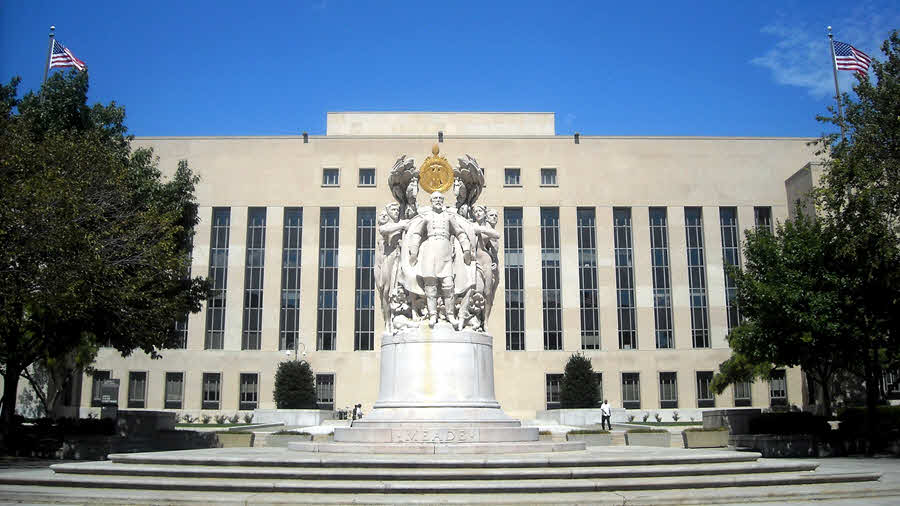Court Nixes FCC’s Double-Verification Mandate on Foreign Sponsorship
Says order exceeded legislative language

The smarter way to stay on top of broadcasting and cable industry. Sign up below
You are now subscribed
Your newsletter sign-up was successful
In a victory for the National Association of Broadcasters, a U.S. appeals court has vacated the Federal Communications Commission’s tightened foreign program-sponsorship disclosure requirements, saying the agency lacked authority to do so.
Broadcasters must still make good-faith efforts to identify foreign-sponsored programming, just not according to a new, specific FCC mandate.
The U.S. Court of Appeals for the D.C. Circuit took a narrow view of legislative language and the FCC’s regulatory authority to interpret it beyond the four corners of the court's reading of that language.
The FCC had said broadcasters needed to check two federal sources to determine a sponsor’s identity, which went beyond the 1934 Communications Act requirement to ask employees and advertisers for the information necessary to establish sponsorship.
The FCC was concerned about China and Russia secretly leasing airtime to broadcast propaganda, and so a unanimous commission voted to toughen the disclosure requirement. In 2021, it adopted an order on “Sponsorship Identification Requirements for Foreign Government-Provided Programming.”
In addition to having to tell sponsors about disclosure requirements, asking them if they, or anyone down the production chain, were a foreign entity or agent, the FCC said stations would now have to “[i]ndependently confirm the sponsor’s status, at both the time of the lease and the time of any renewal, by checking the Department of Justice’s Foreign Agents Registration Act website and the FCC’s U.S.-based foreign media outlets reports.”
The National Association of Broadcasters challenged the double-verification requirement, including on First Amendment grounds. A three-judge panel of the court did not get into the First Amendment issue, but vacated the double-verification requirement.
The smarter way to stay on top of broadcasting and cable industry. Sign up below
It said the FCC had “decreed a duty that the statute does not require and that the statute does not empower the FCC to impose.”
That‘s because the court concluded the statute limited them to requiring broadcasters to exercise “reasonable diligence” in getting info from employees and sponsors, while the FCC extended that to government sources, something that ‘is not in the law Congress wrote.”
The FCC had argued that verification fell within reasonable diligence and its general authority to prescribe appropriate rules and regulations. NAB had argued broadcasters had told the court that the FCC’s decision to make broadcasters affirmatively investigate whether programming — including ads and infomercials — was being paid for by foreign entities was an arbitrary and capricious, unconstitutional response to a “phantom” problem.
Broadcasters’ duty to find out who pays for programming is confined to conducting due diligence to find out from those it deals with directly at the source, NAB had argued. That is because a court already ruled that statutory language imposes no burden of “independent investigation” by licensees.
“NAB appreciates the court’s careful review of the important issues in this case,” said NAB president and CEO Curtis LeGeyt. “Today’s decision ensures that the rules rightly continue requiring the handful of stations airing foreign government-sponsored programming to identify it as such, but removes the burden on the overwhelming majority of stations that never air foreign government-sponsored content.”
FCC chairwoman Jessica Rosenworcel said following the decision: “The principle that the public has a right to know the identity of those who solicit their support is a fundamental and longstanding tenet of broadcasting. It’s about transparency. Consumers deserve to trust that public airwaves aren’t being leased without their knowledge to private foreign actors.”
The Biden administration can appeal the three-judge decision to the full court, though such en banc reviews are not routinely granted. ■
Contributing editor John Eggerton has been an editor and/or writer on media regulation, legislation and policy for over four decades, including covering the FCC, FTC, Congress, the major media trade associations, and the federal courts. In addition to Multichannel News and Broadcasting + Cable, his work has appeared in Radio World, TV Technology, TV Fax, This Week in Consumer Electronics, Variety and the Encyclopedia Britannica.

